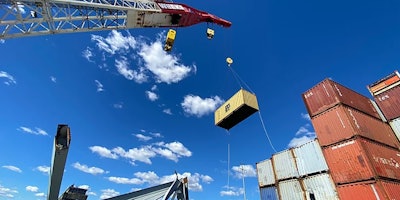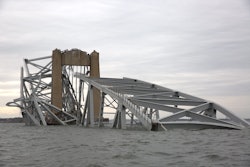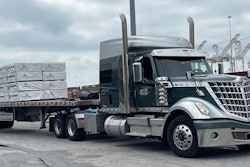The Federal Motor Carrier Safety Administration spelled out further details of, and longer-range possibilities for, the limited hours of service waivers now in place related to the declaration of emergency in Maryland after the collapse of the Francis Scott Key Bridge March 26.
Prior reports suggested three categories of commercial haulers were granted broad relief from HOS regulations' maximum-drive-time limits found in 49 CFR 395.3. Yet the broad exemption applies only to the first category of commercial truckers, those directly supporting removal and port-reopening operations around the destroyed bridge itself, FMCSA reps noted, speaking on background with trade press.
 Recovery/channel-reopening worked continued this week. Shown here is a crane removing containers from the deck of the ship that collided with the bridge, causing its collapse.Maryland Transportation Authority
Recovery/channel-reopening worked continued this week. Shown here is a crane removing containers from the deck of the ship that collided with the bridge, causing its collapse.Maryland Transportation Authority
Those haulers, according to the original April 4 notice, include those who are:
- Transporting equipment and supplies related to immediate repairs to the roadways and navigable waterways adjacent to the Port of Baltimore.
- Transporting wreckage and debris from the navigable waterways providing port access.
The other waivers are decidedly more narrow in focus, and apply to fuel haulers and other freight movers handling rerouted cargo and/or fuel. FMCSA modeled this exemption on the current adverse-conditions exception to allow two extra hours of drive time, extending 11-hour daily limitations to 13 hours, yet keeping the 14-hour duty window in place.

Operators/carriers who can utilize these two exemptions include those hauling:
- Commodities rerouted from the Port of Baltimore to other East Coast ports because of the collapse: fuel; intermodal freight, including shipping containers and their contents; automobiles; or other equipment transported in roll on roll of operations such as heavy duty machinery and farm equipment.
- Fuel from Maryland's Curtis Bay terminal (gasoline, ethanol, propane, natural gas, heating oil) for delivery to the following locations within Maryland: Anne Arundel, Baltimore City, Baltimore County, Carroll County, Cecil County, Frederick County, Harford County, Howard County, Queen Anne’s County, and Washington County.
For carriers serving the Port of Baltimore and running under the short-haul logbook exception, another waiver was granted to allow for greater distances traveled to pick up/deliver freight diverted from the port while it's closed. That waiver exempts those carriers from the requirement to install and use an electronic logging device to record hours if the carrier/operator exceeds the eight days allowed in any 30-day period before that requirement normally kicks in. Any driver found in that situation can continue to use a paper log to satisfy the record-keeping requirement beyond the short haul rule's 150-air-mile boundary.
Find more information on FMCSA's page for the emergency response to the Baltimore bridge collapse at this link. Agency reps noted the waivers would remain in place at least through May 8, when they're set to expire. Personnel were closely monitoring congestion impacts and would consider further extensions and/or modifications depending on what occurs after reopening of the main channel to the port. The Army Corps of Engineers this week estimated that would happen by the end of May.










